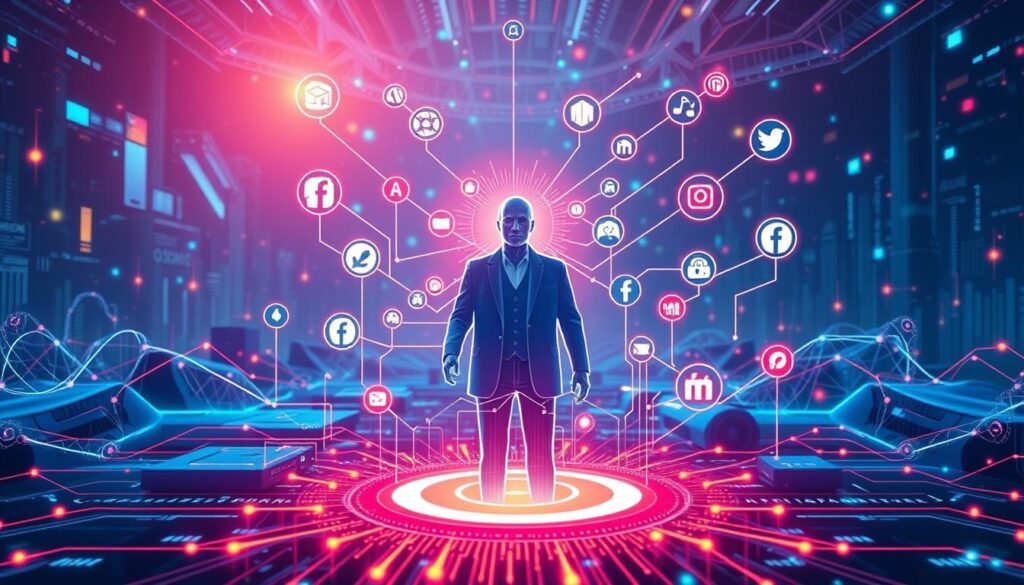Have you ever thought about how AI could boost your content marketing? In today’s digital world, AI in digital marketing and content creation automation are key. They help make your content impactful and authoritative.
Imagine making high-quality content fast. It’s consistent and tailored for your audience. Tools like WriteSonic, Grammarly, and Anyword are leading the way. But, there are challenges, like keeping your brand’s voice true and unique. Let’s explore how AI can improve your content strategy.
Key Takeaways
- AI can greatly boost your content creation speed.
- Tools like Anyword, WriteSonic, and Grammarly offer affordable, high-quality content.
- Automation in content creation means more consistency and fewer mistakes.
- AI-driven content can be made to fit your audience’s needs, improving engagement.
- Despite its benefits, keeping your brand’s voice and authenticity is still a big challenge.
Introduction to AI in Content Marketing
In today’s digital world, AI content generation and machine learning are key for marketers. They save time and ensure quality. AI helps businesses make lots of personalized content quickly.
The Evolution of AI in Digital Marketing
AI has changed digital marketing a lot. Tools like OpenAI’s Sora help make content fast and tailored. AI looks at how people act online to make content that really speaks to them.
AI can even write like a human. This makes content feel real and personal.
Importance of Authority and Engagement
For brands, building authority and engagement is crucial. AI helps by keeping content consistent and true to the brand. It makes content feel real and trustworthy.
Many marketers use AI for content, saving money and improving results. 87% of marketers use AI, saving 54% and seeing better content performance in 58%.
- Scalability: AI makes high-quality content for many channels.
- Efficiency: It cuts content creation time from hours to minutes, boosting productivity.
- Personalization: AI makes content that fits what users like, improving engagement.
As AI gets better at helping with content, the future looks bright. It will mix human creativity with AI’s speed and accuracy, making content both scalable and authentic.
The Role of AI for Content Creation: Building Authority and Engagement
Artificial Intelligence (AI) is changing how we create content. It helps companies build their authority and connect with their audience. With AI tools, businesses can make consistent, top-notch content that shows they’re leaders in their field.
Understanding AI’s Contribution to Content Authority
AI does more than just write text. It uses machine learning to give insights, making sure content is both relevant and authoritative. Tools like Natural Language Processing (NLP) and sentiment analysis help understand what customers think, improving content strategies.
AI tools like Named Entity Recognition (NER) and semantic search help analyze big data. This leads to better content decisions. Almost 9 out of 10 business leaders want to invest more in AI for marketing. AI finds trends in data, helping make content more credible and authoritative.
Engagement Strategies Enhanced by AI
AI makes customer interactions better and more satisfying. It personalizes content based on what users like and do, making it more engaging. AI tools for social media, like Sprout Social, use AI for real-time insights, helping target engagement efforts.
AI predicts what customers will do next, helping marketers plan better. AI automates routine tasks, freeing up time for more meaningful engagement. It also analyzes competitors, giving businesses a chance to improve their strategies.
AI is making a big difference in how we create content and engage with our audience. It’s not just a trend; it’s a key change that helps build stronger connections and brand authority.
Streamlining Content Creation with AI
Artificial intelligence is changing how businesses make content. With AI tools, marketers can make great content fast, keep a consistent style, and connect better with their audience. Let’s see how AI and automation are key in this change.
AI Tools for Efficient Content Creation
Tools like ChatGPT, Wordtune, and Grammarly are changing content creation. They help with ideas, writing, and making content better. For example, ChatGPT can create interesting stories, and Grammarly checks grammar.
Tools like BuzzSumo and Google Trends are great for finding trends and keywords. They help marketers make content that people want to read. AI tools also help find topics that will get a lot of attention.
Automation and Its Role in Content Strategy
Automation is key in today’s content plans. AI helps with tasks like tagging, scheduling, and tracking. This keeps content coming out regularly, which keeps people interested.
Automation saves time and makes sure content is right and consistent. AI tools like SEMrush help with keywords and making content better for search engines. Using AI for trend analysis helps find what people like.
Using AI in content marketing has many benefits. It makes workflows smoother and helps make content more personal. As AI gets better, it will help marketers make even more effective content.
Leveraging AI for SEO Optimization
In today’s digital world, using AI for SEO is key for businesses to get more visibility and reach. AI tools lead the way, making SEO strategies better and faster.
One big plus of SEO with AI content is quick and accurate data analysis. This is crucial in today’s big-data world. 62% of businesses now use AI for SEO, showing its growing role.
Machine learning helps create content that really speaks to people. It also does deep competitive analysis, giving insights on keywords and backlinks. This analysis is deep and wide, helping strategies stay ahead.
Natural language processing (NLP) is changing link building. It uses human speech patterns to make outreach messages better. This is a big step forward in how businesses talk to their audience.
Also, 86% of enterprise SEO pros use AI, proving its worth. AI keyword research looks at more than just volume and competition. It considers the context and meaning of keywords, making sure content matches search intents.
AI also helps improve content. It compares your content to top pages, giving tips on how to make it better. This ensures your content is top-notch.
AI is great at improving visual content too. It analyzes images and videos, suggesting ways to make them better based on trends and user engagement. This makes sure all content is engaging and user-friendly.
AI also works on site speed, mobile friendliness, and finds crawl errors for better indexing. It looks at local search trends, giving specific keyword suggestions for better local visibility. AI tools keep up with trends, making sure your SEO is always current.
Lastly, AI automates SEO tasks, saving time for more important work. With AI, achieving better search results and using resources wisely becomes easier.
Here’s a detailed look at how AI changes SEO:
| Aspect | Traditional SEO | AI-Driven SEO |
|---|---|---|
| Data Processing | Manual and Time-Consuming | Instant and Accurate |
| User Behavior Analysis | Basic Analytics | In-depth with Machine Learning |
| Content Optimization | Manual Adjustments | Automated and Precise |
| Keyword Research | Static, Volume-Based | Dynamic, Contextual |
| Competitive Analysis | Limited Insights | Comprehensive and Real-Time |
| Visual Content | Static Optimization | Trend-Based Enhancements |
| Technical SEO | Manual Checks | Automated and Efficient |
| Local SEO | Manual Adjustments | Region-Specific Recommendations |
| Automation | Limited | Extensive |
In conclusion, using SEO with AI content is more than keeping up. It’s about leading and setting new standards for effective SEO.
AI-Driven Data Insights for Better Content
Using AI-driven data insights in your content strategy can give you a big advantage. AI can look at lots of data and find new trends. This helps companies make better content that people want to see.
Predictive Analysis for Trending Topics
Predictive analysis changes how we find and use trending topics. Tools like Brandwatch and OpenAI’s GPT-4 look at the internet to predict what’s next. By 2026, over 80% of big companies will use AI to help them.
This helps brands be ready for new topics. It stops them from missing chances and keeps their content fresh and interesting.
Personalizing Content with AI Insights
Personalizing content with AI is very powerful. AI tools like Recombee’s Smart Recommendations use data to make content just for you. 85.1% of AI users use it for writing and making content.
AI makes content more personal and engaging. It looks at lots of data to suggest content that people will like. This makes content more relevant and boosts business, which AI says can grow by 40%.
| AI Tool | Primary Function |
|---|---|
| OpenAI’s GPT-4 | Text content creation |
| InVideo AI | Video content creation |
| Recombee’s Smart Recommendations | Personalized content recommendations |
The Benefits of AI in Building Brand Authority
In today’s digital world, AI helps brands become leaders. It brings consistency and quality to brand management. These are key for a strong brand image.
Consistency and Quality Through AI
AI makes sure your brand’s message is the same everywhere. This helps people recognize and trust your brand. For example, Nike uses AI to design cool sneakers that match their brand perfectly.

AI also makes sure your content is top-notch. It works fast and can handle a lot of tasks. This lets humans focus on creative ideas and strategy. Together, they make your brand look even better.
Strengthening Trust with AI-Generated Content
Trust is key for any brand. AI helps by making content that feels personal. This makes people feel closer to your brand.
Google says good content must be expert, authoritative, and trustworthy. AI can help meet these standards. It makes your brand seem more reliable and in control.
Successful brand management combines human and AI intelligence. — Harvard Business Review, September-October 2024
AI also saves time and money on creative tasks. It helps in designing products and talking to customers. This boosts your brand’s image and makes AI a must-have for marketing.
| Aspect | Human Intelligence | AI Intelligence |
|---|---|---|
| Content Consistency | Varies with individual effort | Highly consistent |
| Emotional Engagement | High | Moderate |
| Efficiency & Scalability | Limited by human capacity | Unparalleled |
| Personalization | Requires detailed audience insights | Driven by data analysis |
Case Studies: Success Stories of AI in Content Creation
The digital marketing world is changing fast. AI content marketing success stories show how big of a difference artificial intelligence makes. By 2025, over 75% of businesses will use AI to make content, changing how brands plan and use content.
Jennifer’s team had to make up to 50 pieces of content every week in 2024. They used AIContentPad and saw amazing results:
- They made 30% more content for 62% less money.
- They focused on better content, which led to more people engaging.
- They doubled engagement in key sales channels.
Companies like Coca-Cola used AI for personalized ads and saw big gains in engagement and sales. Spotify’s “Discover Weekly” feature, powered by AI, kept users coming back for more. These examples show how AI can make content more personal and engaging.
Netflix and Nike also used AI to keep viewers and customers coming back. Sephora used AI to make shopping better, leading to more sales and happier customers.
The market for AI in content creation is growing fast. It’s expected to jump from $1.2 billion in 2020 to $12.7 billion by 2026. AI tools are also making content creation faster, like a study where AI helped make video ads 26% more effective.
In fields like law, finance, and real estate, AI is a big help. It creates content that meets specific needs. These AI content marketing success stories highlight the value of using AI in content creation. They show how AI can lead to new ideas and success in the future.
Challenges and Pitfalls of Using AI for Content
As AI becomes more common in content creation, businesses face many content marketing challenges with AI. One big problem is making sure AI-generated content is high quality and real. AI tools can quickly make text, images, and more, but there are downsides to this.

Quality Control Issues
AI content needs careful human checking. Even with better Natural Language Processing (NLP), AI can still get things wrong. For example, OpenAI’s ChatGPT was banned on Stack Overflow because it was not accurate.
This shows that human editors are key to making sure AI content is good. This might seem to go against the cost savings of using AI, as businesses still need to pay for editors.
Maintaining Authenticity in AI-Driven Content
Keeping a brand’s voice and connection with readers is another big challenge in content marketing with AI. AI can make content fast, helping businesses grow their output. But, this speed might mean less creativity and personal touch.
AI content often misses the emotional and original touches that human writers bring. While AI is great at research, translation, and making templates, relying too much on it can damage a brand’s authenticity and trust.
It’s important to find a balance between AI and human creativity. Adding human touches, like editing and planning, makes content more engaging and relatable to the audience.
Future Trends in AI for Content Marketing
The world of AI in content marketing is changing fast. New ideas and strategies are coming up all the time. It’s important for marketers to keep up with these changes to use AI well.
Innovations and Predictions
Looking ahead, content marketing is set for exciting changes. Generative AI tools like ChatGPT are changing how we make content. They help create lots of content, from blog posts to social media and emails.
AI is also helping with smart choices. It uses algorithms to guide decisions on what to sell, how much to spend on marketing, and what products to make.
| Trend | Description |
|---|---|
| Generative AI | Enhances content creation with tools like ChatGPT for producing high-volume content. |
| Predictive Analytics | Improves data-driven decisions regarding inventory and marketing strategies. |
| AI-Powered Chatbots | Provides 24/7 personalized customer support and enhances user experience. |
AI is also making marketing more personal. It looks at lots of customer data to make content and offers that fit what each person likes. This leads to more people engaging with the content.
Preparing for the Future of AI in Content Strategy
To make the most of these new tools, marketers need to keep learning and be ready to change. Here’s how to get ready for the future:
- Keep up with the latest AI tools and ideas for content marketing.
- Get training in AI to improve your skills in data analysis and content making.
- Choose AI tools that fit your marketing goals and what your audience likes.
As AI keeps changing content marketing, it’s crucial to embrace these trends. This will help you stay ahead and keep succeeding.
Conclusion
Artificial intelligence in content marketing does more than just automate tasks. It helps businesses become authorities and engage their audience better. AI makes creating content faster and more efficient, keeping quality high for effective brand messages.
AI tools cut down on manual work, letting businesses make content quicker and in less time. For example, Talespin’s AI-powered CoPilot Designer is changing VR content creation, like educational modules. AI makes content more personal, leading to better engagement and higher conversion rates.
AI also helps human creators by analyzing content for ways to improve it. It makes content easier to read and suggests changes for better structure. This ensures content meets and often exceeds what audiences expect. Looking ahead, AI will be key in shaping content creation, optimization, and sharing in digital marketing.
